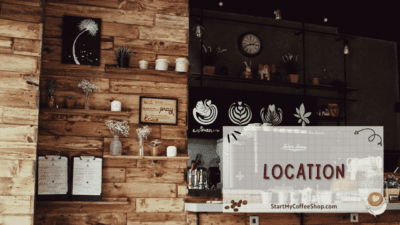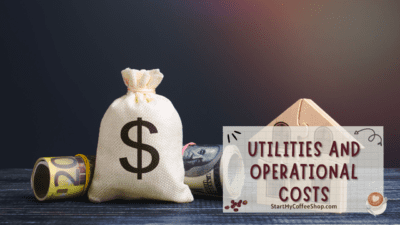Opening a coffee shop can be an exciting venture. It provides a space for people to gather, enjoy a cup of joe, and foster a sense of community. However, before embarking on this caffeinated journey, it’s crucial to understand the startup costs involved.
Launching a coffee shop entails several startup costs kike location rental, equipment, licenses, staffing, inventory, marketing, and utilities. On average, it can range from $80,000 to $300,000 or more.
In this article, I will explore the various expenses associated with launching a coffee shop and provide insights to help you plan and budget effectively.
Location

The chosen spot will not only determine the level of visibility your business enjoys but also the amount of foot traffic it attracts. However, it’s important to note that prime locations often come with a hefty price tag.
Rental costs can vary significantly based on the city, neighborhood, and even the specific street where you plan to set up shop. It’s imperative to conduct thorough research to gain a comprehensive understanding of the local rental market. This will allow you to make informed decisions and allocate your budget accordingly.
Consider the lease agreements available to you. Evaluate the terms and conditions, paying close attention to the duration of the lease, rent escalations, and any potential additional costs. Understanding the financial commitment involved will help you plan effectively and avoid any surprises down the line.
Additionally, assess the size and layout of the property. Consider whether it can accommodate the desired capacity for seating, counter space, and storage areas. Keep in mind that certain neighborhoods may have restrictions on the number of seats or zoning regulations, so it’s important to familiarize yourself with local laws and regulations.
Renovations may be necessary to transform the chosen space into a functional coffee shop. Take into account any required updates, repairs, or aesthetic enhancements. These costs should be factored into your overall budget to ensure a smooth transition from a vacant space to a charming coffee destination.
Read more about: Cost to Start Coffee Shop: The Dollars Behind the Espresso
Equipment and Furnishings
The core equipment needed for a coffee shop includes espresso machines, grinders, brewers, and refrigerators. These are the backbone of your coffee-making process, and the quality of these machines will directly impact the taste and consistency of your beverages. It’s crucial not to skimp on these items and opt for reputable brands that are known for their performance and reliability.
In addition to the coffee-making equipment, you’ll also need display cases to showcase pastries, snacks, and other treats. These cases should be visually appealing and practical for customers to make their selections. Tables and chairs are necessary to provide seating for your patrons, and comfort should be a key consideration when choosing these furnishings.
While prices for equipment and furnishings can vary, it’s important to prioritize quality over cost-cutting measures. Investing in reliable equipment will ensure that your coffee is consistently delicious and your operations run smoothly. Cutting corners on furnishings may result in discomfort for your customers and a less inviting ambiance, ultimately affecting their overall experience and willingness to return.
Consider consulting with industry experts or reputable suppliers when selecting your equipment and furnishings. They can guide the best options within your budget and help you make informed decisions.
Creating a memorable coffee experience goes beyond just the taste of the brew—it encompasses the entire atmosphere and ambiance of your coffee shop. By investing in quality equipment and furnishings, you’ll set the stage for a delightful and satisfying experience for your customers.
Licenses, Permits, and Legal Fees
Firstly, obtaining permits for food handling is crucial. This ensures that you meet the necessary health and safety standards when preparing and serving food items. The specific requirements may vary depending on your location, but it generally involves inspections by local health departments to ensure proper sanitation practices are in place.
Additionally, health and safety inspections may be required to assess the overall safety of your establishment, including fire safety, ventilation, and emergency exits. These inspections aim to create a safe environment for both customers and employees.
If you plan to serve alcohol in your coffee shop, you will likely need to obtain a liquor license. The process for obtaining a liquor license can be complex and varies from region to region. It involves meeting specific criteria, such as age restrictions and responsible alcohol service practices. It’s crucial to understand the regulations and requirements in your jurisdiction to navigate this process effectively.
Moreover, obtaining a business license is often necessary to legally operate your coffee shop. This license ensures that your business is registered, compliant with local regulations, and pays appropriate taxes. The fees associated with obtaining a business license can vary based on your location and the nature of your business.
Navigating these legal requirements can be challenging, so it may be beneficial to hire legal services to guide you through the process. A lawyer experienced in business law can assist in understanding the specific regulations, filing the necessary paperwork, and ensuring compliance with all legal obligations.
It’s important to note that the costs associated with these legal requirements can vary depending on your location and the specific circumstances of your coffee shop. Therefore, consulting with a professional or seeking legal advice is highly recommended to gain clarity on the associated expenses and fulfill all legal obligations effectively.
By addressing these legal requirements and regulations, you can operate your coffee shop with confidence, knowing that you are compliant and providing a safe and legally sound establishment for your customers.
Staffing and Training

Assess the number of employees you need based on your expected customer volume. Understanding your peak hours and customer flow will help you determine the optimal staffing levels. Having too few employees during busy periods can lead to long wait times and a decline in service quality. On the other hand, having too many staff members during slow periods can increase your operational costs unnecessarily.
When budgeting for staff wages, consider factors such as minimum wage requirements, local industry standards, and the level of experience you’re seeking. Offering competitive wages will attract and retain talented individuals who are passionate about coffee and customer service. Additionally, factor in benefits such as health insurance, retirement plans, and paid time off to ensure you can provide a competitive employment package.
Investing in training programs and ongoing education for your staff is crucial for maintaining a high level of service and product quality. Develop comprehensive training protocols that cover coffee preparation techniques, customer service skills, and knowledge of your coffee offerings. Regularly review and update training materials to keep your baristas up-to-date with industry trends and new brewing methods.
Consider hosting workshops or inviting industry experts to conduct training sessions for your staff. Encourage your baristas to participate in coffee competitions and attend coffee-related events. This not only enhances their skills but also fosters a sense of pride and motivation within your team.
Read more about: Cost to Start a Small Coffee Shop: From Concept to Checkout
Inventory and Supplies
Running a coffee shop entails the constant task of replenishing inventory and supplies to meet customer demand. From coffee beans and milk to sweeteners, cups, lids, napkins, and cleaning supplies, a well-stocked inventory is essential for smooth operations.
Properly estimating the quantity of inventory needed and determining the frequency of restocking is crucial for accurate budgeting and minimizing waste. Building strong relationships with suppliers and negotiating favorable terms can also help reduce ongoing expenses.
To manage your inventory effectively, it’s important to keep track of sales data and monitor trends. Analyze past consumption patterns to estimate the quantity of coffee beans, milk, and other perishable items needed regularly.
Taking into account factors such as seasonality, daily foot traffic, and popular menu items can help you make accurate forecasts. Implementing inventory management systems or software can streamline this process, ensuring that you have the right amount of stock available at all times.
Establishing reliable relationships with suppliers is key to securing quality products and favorable pricing. Seek out reputable suppliers who can consistently provide you with fresh and high-quality ingredients and supplies. Maintaining open lines of communication with your suppliers allows for efficient restocking and prompt resolution of any issues that may arise.
Negotiating favorable terms with suppliers can have a significant impact on your ongoing expenses. Consider discussing discounts for bulk purchases, flexible payment options, or extended credit terms. Building a mutually beneficial relationship based on trust and reliability can result in cost savings over time.
Marketing and Advertising
This involves a range of activities, including designing a captivating logo, creating an engaging website, implementing engaging social media campaigns, printing menus and flyers, and exploring local advertising opportunities. Allocating a budget specifically for marketing initiatives is essential, and considering a combination of traditional and digital marketing channels can help you effectively reach your target audience.
Developing a visually appealing logo is an important first step in establishing your coffee shop’s brand identity. Your logo should be eye-catching, memorable, and reflect the unique character of your business. A professional graphic designer can assist you in creating a logo that encapsulates your coffee shop’s personality and values.
Creating a user-friendly website is another crucial aspect of your marketing efforts. Your website should showcase your coffee shop’s atmosphere, menu, and location, and should be optimized for mobile devices. It is also a valuable platform to share information about special promotions, events, and loyalty programs.
Utilizing social media platforms is a powerful way to engage with your target audience and build an online community. Regularly posting appealing visual content, interacting with followers, and running targeted ad campaigns can help increase your brand visibility and attract new customers. Social media platforms also provide opportunities for customer feedback and reviews, which can further enhance your reputation.
In addition to digital marketing, traditional advertising methods such as printing menus, flyers, and posters can be effective in reaching potential customers within your local area. Placing ads in local newspapers, magazines, or community notice boards can also help increase your visibility among the local population.
Utilities and Operational Costs

Utilities such as electricity and water are essential for the daily operations of your coffee shop. Researching the average costs in your area can help you estimate these expenses accurately. Consider factors such as energy-efficient equipment and lighting to minimize your utility bills over time.
In today’s digital age, internet, and phone lines are vital for smooth communication and online presence. Evaluate different service providers and choose the most suitable plans for your business needs. Additionally, waste management costs, including waste disposal and recycling, should be factored into your financial plan.
Insurance is another essential expense to protect your coffee shop from unforeseen events such as accidents, liability claims, or property damage. Consult with insurance providers to determine the appropriate coverage for your business and budget for the premiums accordingly.
It’s also important to consider recurring costs related to equipment maintenance and repairs. Regular upkeep of coffee machines, grinders, refrigeration units, and other equipment ensures their longevity and prevents unexpected breakdowns. Budgeting for these ongoing expenses can help you avoid costly repairs or the need for emergency replacements.
Lastly, unexpected expenses may arise, such as repairs due to equipment failures or unforeseen renovations to comply with updated regulations. It’s wise to set aside a contingency fund to handle such unforeseen costs, providing a safety net for your business.
Read more about: Cost to Start a Coffee Shop: The Financial Blueprint
Frequently Asked Questions

Q: How much does it cost to lease a coffee shop space?
A: Generally, commercial rents can range from $1,500 to $10,000 per month or more.
Q: What equipment is essential for a coffee shop?
A: Essential equipment for a coffee shop includes espresso machines, grinders, brewers, refrigerators, display cases, tables, chairs, and POS systems.
Q: What licenses and permits are required to open a coffee shop?
A: Common permits include food handling, health and safety inspections, and business licenses. Liquor licenses may be necessary if serving alcoholic beverages.
To learn more on how to start your own coffee shop, check out my startup documents here.
Disclaimer: The information provided by StartMyCoffeeShop.com (“The Site”) is for general informational purposes only. All information on the Site is provided in good faith. However, we make no representation or warranty of any kind, express or implied, regarding the accuracy, adequacy, validity, reliability, availability, or completeness of any information on the Site. Under no circumstance shall we have any liability to you for any loss or damage of any kind incurred as a result of the use of the Site or Reliance on any information provided on the Site. Your use of the Site and reliance on any information on the Site is solely at your own risk. This blog post is for educational purposes only and does not constitute legal advice. Please consult a legal expert to address your specific needs. Terms and Conditions. (https://startmycoffeeshop.com/terms-and-conditions/)

Hi! I’m Shawn Chun
My adventure in coffee began when I first launched my first coffee shop back in the early 2000s. I had to figure out so many things on my own and to make it worse within 2 years of opening two large corporate coffee chains moved in just blocks away from me!
As I saw smaller and even some larger coffee shops in the neighborhood slowly lose customers to these giant coffee chains and slowly close up shop, I knew that I had to start getting creative…or go out of business.
I (like you may be) knew the coffee industry well. I could make the best latte art around and the foam on my caps was the fluffiest you have ever seen. I even had the best state-of-the-art 2 group digital Nuova Simonelli machine money could buy. But I knew that these things alone would not be enough to lure customers away from the name brand established coffee shops.
Eventually, through lots of trial and error as well as perseverance and creativity I did find a way to not only survive but also thrive in the coffee/espresso industry even while those corporate coffee chains stayed put. During those years I learned to adapt and always faced new challenges. It was not always easy, however, in the end, I was the sole survivor independent coffee shop within a 10-mile radius of my location. Just two corporate coffee chains and I were left after that year. All told the corporate coffee chains took down over 15 small independent coffee shops and kiosks and I was the last one standing and thriving.
Along the years I meet others with the same passion for coffee and I quickly learned that it is not only “how good a barista is” that makes a coffee shop successful, but the business side of coffee as well.
Hence why I started this website you are on now. To provide the tools and resources for up and coming coffee shop owners to gain that vital insight and knowledge on how to start a coffee shop successfully.
Stick around, browse through my helpful blog and resources and enjoy your stay! With lots of LATTE LOVE!
Shawn







